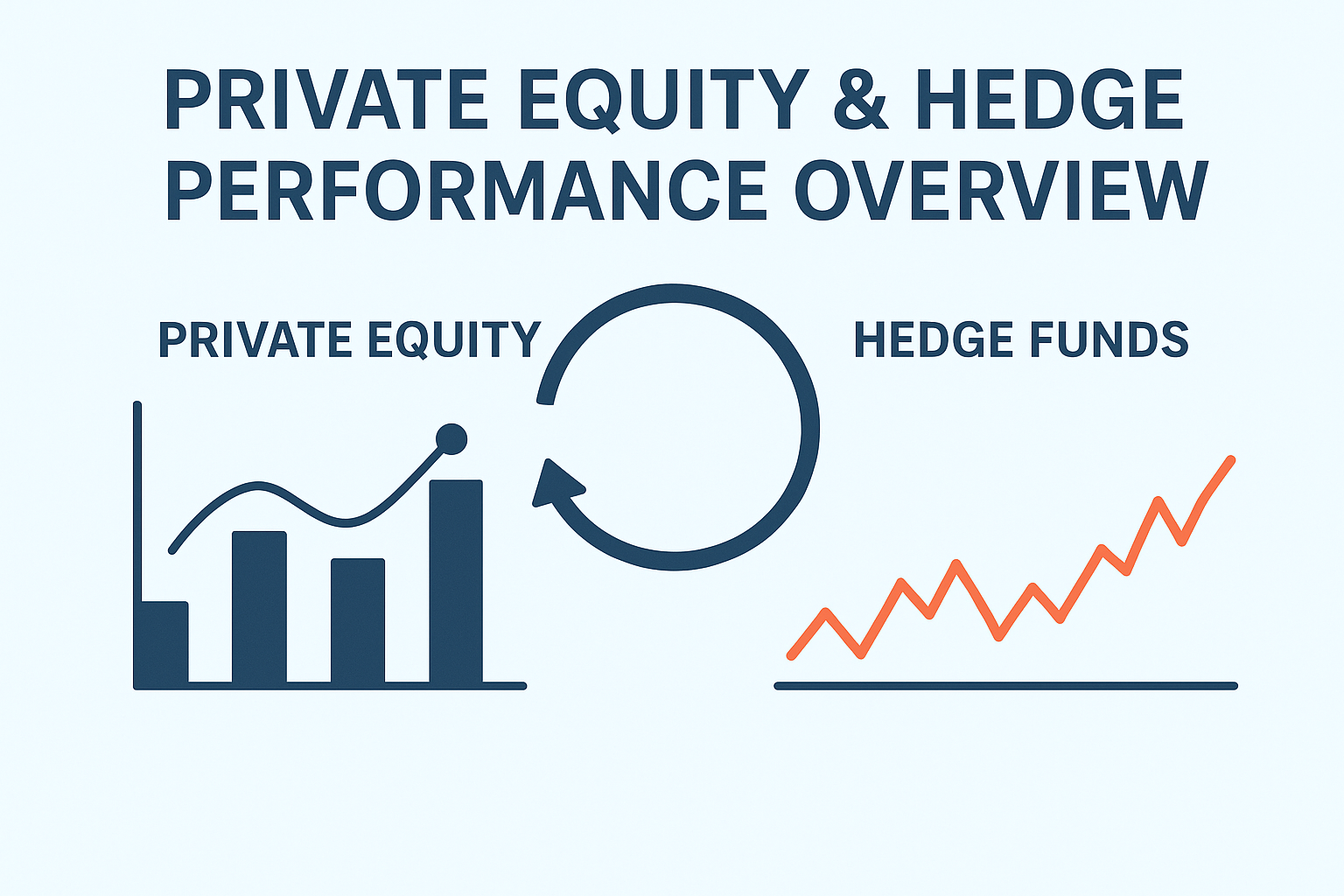Private Equity & Hedge Fund Performance Overview 💼📊
Introduction to Alternative Investments
In the world of finance, private equity (PE) and hedge funds (HF) are often regarded as the power players of the investment landscape. Unlike traditional investments such as stocks, bonds, or mutual funds, these alternative asset classes aim to deliver higher returns, portfolio diversification, and unique risk-reward profiles.
They attract high-net-worth individuals, institutional investors, and pension funds because of their potential for outsized performance — but they also come with higher risks and complexity.
What Are Private Equity and Hedge Funds?
-
Private Equity (PE) involves investing directly in private companies or buying public companies to take them private. The goal is to improve their value over time before selling at a profit.
-
Hedge Funds (HF) pool money from investors and pursue various investment strategies, often using leverage and derivatives to amplify returns.
While both seek high returns, PE investments are typically long-term and illiquid, whereas HFs focus on shorter-term opportunities and offer more liquidity.
Why Investors Choose Alternative Assets
Investors are increasingly drawn to alternative investments because they offer:
-
Portfolio Diversification 🌀 – Reducing reliance on stock and bond market performance.
-
Inflation Protection 📈 – Some strategies outperform during inflationary periods.
-
Potentially Higher Returns 💰 – The chance to outperform public market benchmarks.
Understanding Private Equity 📈
Private equity focuses on buying, improving, and selling companies. These investments often require years before realizing returns, but when executed well, they can be highly profitable.
Types of Private Equity Investments
-
Venture Capital 🚀 – Funding innovative startups at early growth stages.
-
Growth Capital 🌱 – Providing funds to established companies for expansion.
-
Buyouts 🏢 – Acquiring controlling stakes in companies, often restructuring operations to boost efficiency.
Performance Metrics in Private Equity
Success in PE is often measured using:
-
Internal Rate of Return (IRR) – Reflects the annualized return of an investment.
-
Multiple on Invested Capital (MOIC) – Shows how much value was created relative to invested capital.
-
Cash-on-Cash Returns – Tracks actual cash profits versus initial investment.
Understanding Hedge Funds 📊
Hedge funds operate differently from private equity. They invest in publicly traded assets, often with complex strategies that allow them to profit in both rising and falling markets.
Common Hedge Fund Strategies
-
Long/Short Equity 📉📈 – Buying undervalued stocks and shorting overvalued ones.
-
Event-Driven 📅 – Capitalizing on market events such as mergers, acquisitions, or bankruptcies.
-
Macro Trading 🌍 – Making bets on economic trends like interest rate changes or currency movements.
Performance Measurement in Hedge Funds
Hedge funds often evaluate success using:
-
Sharpe Ratio – Measures risk-adjusted returns.
-
Alpha – The excess return compared to a benchmark.
-
Annualized Returns – Average yearly performance over time.
Comparing Performance – Private Equity vs Hedge Funds 🔍
Historically, private equity has delivered higher average returns than hedge funds. However:
-
PE offers less liquidity — capital is often locked in for 5–10 years.
-
HFs provide quicker access to funds and can adapt faster to market changes.
Factors Influencing Performance ⚖️
-
Market Conditions – Booming economies often favor PE, while volatile markets can benefit HFs.
-
Fund Manager Expertise – A skilled manager can make a significant difference in returns.
-
Fee Structures – High management and performance fees can reduce net returns.
Current Performance Trends (2024–2025) 📅
-
Private Equity – Strong deal flow in technology, healthcare, and renewable energy sectors.
-
Hedge Funds – Growth in macro strategies and AI-driven algorithmic trading.
Risks and Challenges ⚠️
-
Regulatory Changes – Can disrupt strategies and operations.
-
Economic Downturns – Reduce valuations and investor returns.
-
Leverage Risks – Using excessive debt can magnify both gains and losses.
Conclusion
Private equity and hedge funds remain cornerstones of sophisticated investment portfolios. Choosing between them depends on your liquidity needs, risk appetite, and investment horizon. For patient investors seeking high returns, PE can be appealing. For those wanting more flexibility, hedge funds may be the better option.
FAQs
1. Which has higher returns – private equity or hedge funds?
Historically, PE has produced higher average returns, but it comes with longer lock-up periods.
2. Are hedge funds riskier than private equity?
It depends on strategy — some hedge funds are highly leveraged, increasing potential risks.
3. Can retail investors access these investments?
Generally, they are limited to accredited or institutional investors.
4. What is the average holding period for private equity?
Typically between 5 to 10 years.
5. Do hedge funds outperform stock markets?
Not always — while some funds beat the market, many underperform over the long term.
 Helpful Internal and External links
Helpful Internal and External links
Investment Portfolio and Diversify Investments
